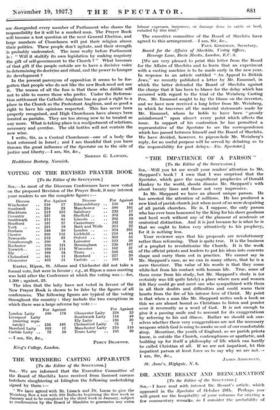" THE IMPATIENCE OF A PARSON "
[To the Editor of the SPECTATOR.]
you let me recall your readers' attention to Mr. Sheppard's book ? I own that I was surprised that the Spectator, which gave the magnificent prophecies of Donald Hankey to the world, should dismiss Mr. Sheppard's with about twenty lines and those not very impressive.
In Mr. Sheppard we have an almost unique parson. He has arrested the attention of millions. He has produced a new kind of parish church just when most of us were despairing of all parish churches. He is, I suppose, the only parson who has ever been honoured by the King for his sheer goodness and hard work without any of the glamour of academic or oratorical distinction. And it is just because he is what he is that we ought to listen very attentively to his prophecy, for it is nothing less.
Your reviewer says that his proposals are revolutionary rather than reforming. That is quite true. It is the business of a prophet to revolutionize the Church. It is the work of the official priests and leaders to put his ideas into concrete shape and carry them out in practice. We cannot say in Mr. Sheppard's case, as we can in many others, that he is a mere theorizer. The value of his words is that they come white-hot from his contact with human life. True, some of them come from his study, but Mr. Sheppard's study is (or certainly was till quite lately) a place where men and women felt they could go and meet one who sympathized with them in all their doubts and difficulties and could warm their hearts from the fire of his intense love of Christ. My point is that when a man like Mr. Sheppard writes such a book as this we are almost bound as Christians to listen and ponder over it reverently as a word of God. It is not enough to give it a passing smile and to account for its exaggerations by referring to his sad illness. Rather we should ask our- selves whether these very exaggerations arc not the necessary weapons which God is using to awake us out of our comfortable sleep. Meantime, the youth of England, as we parish priests know, is outside the Church, contemptuous or apathetic, and building up for itself a philosophy of life which can hardly be called Christian at all. If we are not impatient, let this impatient parson at least force us to say why we are not.— I am, Sir, &c.,














































 Previous page
Previous page